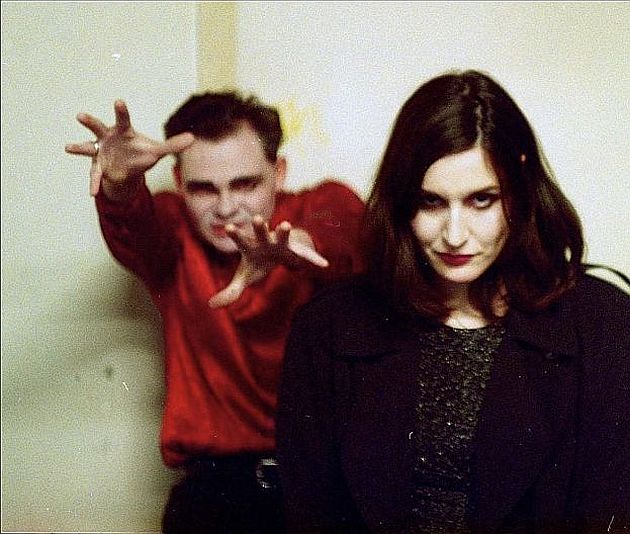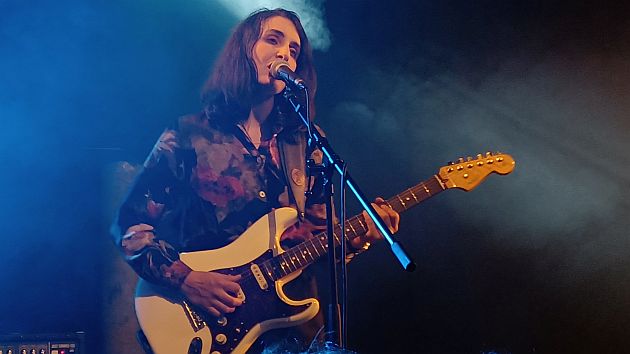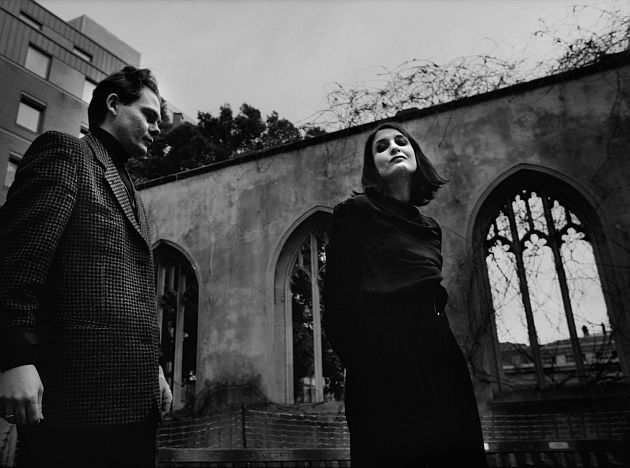 Interview with
Interview with Larissa Iceglass (vocals, guitar) and William Maybelline (vocals, bass guitar, synthesizer) from Lebanon Hanover
In October 2020, LEBANON HANOVER released their latest album ‘Sci-Fi Sky’. Due to the pandemic, they were unable to present their new music live for a long time - since spring this year, this has finally been possible again. Larissa Iceglass and William Maybelline have been on tour again since March. I had the opportunity to meet them before their concert in Oberhausen and talk to them, among other things, about their inspirations for their extraordinary and emotional music, their musical history and their connection to vinyl records.
Reflections of Darkness [RoD]: How does it feel to be on tour again?
William: It’s rejuvenating! We are flashed with energy and excitement - it’s so empowering to be able to do it again.
Larissa: I started to appreciate it much more than I did in the past. The reason why we do all that is to perform. And when it was taken away from us, I realized how important it is.
RoD: What did the time of the pandemic do to you? Do you think you changed in some way?
William: Maybe in a way. It came so fast and we all had to realize that our lives are changing. It was a kind of a big dramatic life change! It all went so fast; it was a big reminder that life is literally fleeting and all can change in a second.
RoD: Your actual album ‘Sci-fi’ sky was released during the pandemic, so it took some time until you were able to present it live. How did the fans accept it?
Larissa: We released the album about one and a half years ago and we hadn’t played the tracks live. So now it’s still new for us and for the people who haven’t heard the songs live yet. And the acceptance is very good!
William: Yes, I also have the feeling that it’s still fresh for us and the fans! It’s still new for everyone, because it’s different to hear the tracks live than on the album, of course.
RoD: On the album you talk about different themes: Digitisation (‘Digital Ocean’), we hear about dystopian sceneries (‘Sci-Fi Sky’), melancholy (‘Hard Drug’, ‘The Last Thing’), but also words full of love from William to his son (‘Angel Face’). Can you tell us something about the making of the album?
Larissa: The influences came from very different sources. We went more into New Folk and Industrial music, doom and even metal. It went from different styles and we just opened up and experimented a lot. And of course, a lot of things influenced us personally. It’s a very personal album. ‘Hard Drug’ for example is about missing your best friend. I mean when you have a relationship and you get hurt - it’s the same with friends. The big pain of missing someone.
William: Life-wise things were happening. It was very powerful, for example, to have a new-born in my life. A lot of me came out in the album, too. We specifically wanted to try to bring a different flavour to this album - and I feel that we did. Even for me a lot of the tracks of this album were ripping off my heartstrings! There is a lot of meaning in the songs and we both feel it in different ways.

RoD: How do you both give different influences, your different personalities into your music?
Larissa: This is hard to answer because it always depends on how we work and how often we see each other. ‘Sci-Fi Sky’ for example was created by writing tracks at home and sending them back and forth. But when we are together in the studio and create the tracks together from the start it’s different. It always changes. In the end I don’t’ remember exactly who gave what influence into the individual songs. Not living at the same place can make it a bit hard. But in the end, we finish the tracks together.
RoD: Looking back to your more than ten years lasting band history, how did you develop - regarding your music and your personalities?
William: It feels like there is more dynamics now…
Larissa: Minimalism to maximalism! (laughs).
William: It was a long way so far, I picked up more skills in writing and producing.
Larissa: I got more self-confidence. I was extremely timid and insecure at the start. But with all the response we got that changed. For example, when 700 people come to see you and you see that you are not all alone in the world - as I used to think - it’s phantastic.
RoD: Do you remember the moment you were sure to dedicate your lives to music and do it professionally?
Larissa: Yes, and basically it was very much listening to the heart. It was absolutely unreasonable because I didn’t have any income. I cancelled my art studies in Berlin because I wanted to make music, I wanted to do what I love. And in the end, it was the right way, I really cherish it. It’s like a miracle.
William: My main turning point was when I went to university where I studied design and illustration. I was maybe two months there and got money to invest in my art studies, but I took a music interface and speakers to be able to record. From that point I said that I won’t go to university anymore, I will only make music. It was in my early twenties. That was the starting point. Everything else was sacrificed for the music - there was no question about it. Even if we got not much money in the beginning and we had to survive somehow.
RoD: Did you grow up with music, did you learn an instrument in your childhood?
William: I didn’t learn an instrument, but my father was a DJ and my brother played a lot of music as a child - so there was a kind of a musical background.
Larissa: I learned to play guitar when I was about fourteen, I took lessons - but only for about two years. I wanted to go more into minimalism or punk.

RoD: What music did you listen to you in your teenage years?
Larissa: That is too embarrassing to say probably (laughs).
William: When I was young, I listened to Rave music, what is completely different to what I am doing now! I think it’s part of where I am from - I come from North-Eastern England and Rave was a huge thing at the time, I was surrounded by it.
Larissa: I can’t say that I listened to many bands when I was young, but when I became sixteen that changed. Then it was KRAFTWERK that changed a lot for me. Before that it was more random stuff.
RoD: For example?
Larissa: OASIS for example, let’s say the name (laughs). But yes, this was the music I learned at the guitar for example. Or FRANZ FERDINAND. It was at the time when I was sixteen, and I didn’t have so much access to other music. There wasn’t so much YouTube and so on, and so I listened to music that came to me somehow.
RoD: What kind of music are listening to know?
William: Different things. DEATH IN JUNE, for example, sometimes SWANS, but I also like to listen to EBM like FRONT LINE ASSEMBLY. I am very mixed.
RoD: Tonight, you share the stage with SELOFAN. Being at the same record label - Fabrika Records - which Joanna and Dimitris from SELOFAN own, there is a special connection between you. What makes it so special?
Larissa: We feel very comfortable together, we are similar, two people in the band and we are very good friends as well - so we have a good time together! It’s very special every time.
RoD: Do you remember a concert you joined as a fan that was life-changing? A show that you will never forget?
William: Amazingly I never had that! I wish I would have, but… no!
Larissa: I probably had that with DAF. We are not like DAF at all, but it was the best concert I have ever seen! I think it was about 2009.
RoD: You release your albums also on vinyl. How important are vinyl records for you in contrast to streaming platforms?
Larissa: We have always been the biggest fans of vinyl records. We love to listen to an album from the start to the end. That’s the beauty of it.
William: It’s a shame that now you can take all of your favourites in a playlist with single songs. Okay, it’s cool in a way, but at the same time you mustn’t dismiss that there is actually an album belonging to a track. And if there is an album around that track, at least go through it! Nowadays people only listen to single songs, that is so selective, and it’s a shame because for an artist making an album takes a lot of time and effort. And this work should be appreciated.

RoD: Are there any plans for a new album already? Can you reveal something?
William: Yes, there are already five tracks for a new record! We decided to work on the next album as much together as possible. We don’t want to make it so much online like the last one.
Larissa: We work in the studio in Athens now, we meet there whenever there is a gap for us to go there. So - it’s in the making! And as William said - we want to make it together.
RoD: Can you describe what difference it makes to work really together on an album than just from a distance?
Larissa: It is absolutely different. We did our first three albums together. Later we lived in different countries and it was hard work. Now we know that we want to be together in a studio and have access to all the equipment we need.
William: We absolutely want to get back to work physically together. It is much more creative, it’s interaction - and not waiting for an e-mail with a track. A lot of creativity gets lost by working only digitally.
RoD: One last question: What does music mean to you?
Larissa: A life without music is pointless for me. I cannot imagine it. It’s like the source of everything. When you go through very hard times, music can save you.
William: It’s the spice of life! It’s part of existing! Like an extra-energy. Music will never let you down. It’s immortal. It’s forever.
RoD: Thank you very much for the interview!
https://lebanonhanover.bandcamp.com/
Pictures by Caroline Bonarde & Polar Noire / Live picture by Mirjam Wilhelm




